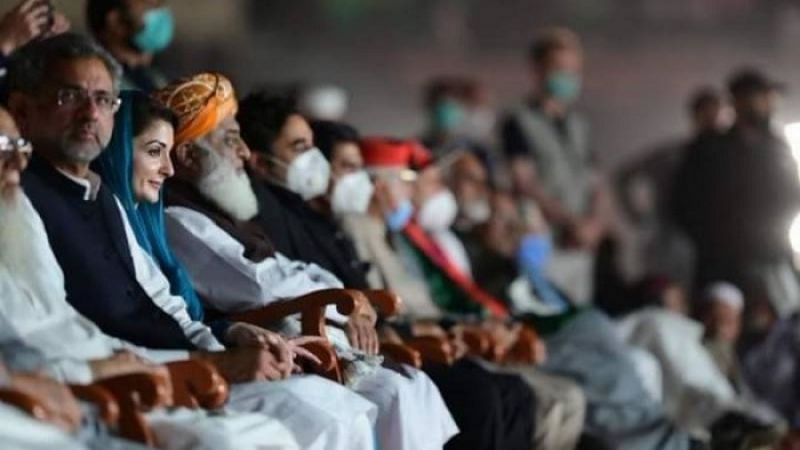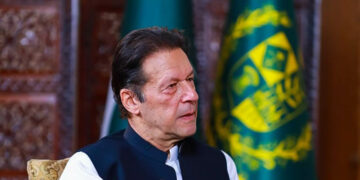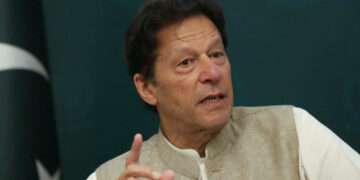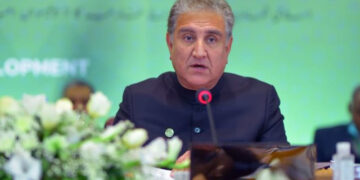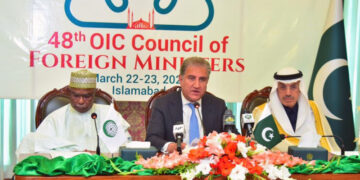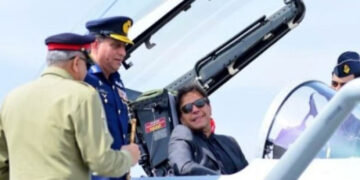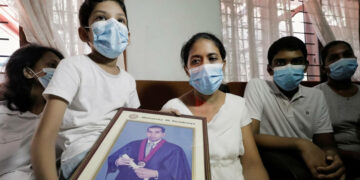In less than a week after jointly contesting elections for top Senate offices, cracks within the ranks of the opposition’s Pakistan Democratic Movement (PDM) became visible on Tuesday when the alliance leadership announced postponement of their March 26 anti-government long march due to differences over the issue of submitting en masse resignations from the assemblies.
Talking briefly to media after presiding over nearly five-hour-long meeting of the heads of the component parties of the PDM as its president, Jamiat Ulema-i-Islam chief Maulana Fazlur Rehman said the PPP had sought more time to reconsider its position on the issue of en masse resignations and till the time the PPP would come back after an in-house discussion in its Central Executive Committee (CEC), the long march stood “postponed”.
Visibly upset over the development, the Maulana immediately left the press briefing after making a short statement, leaving behind the long-faced Pakistan Peoples Party (PPP) and Pakistan Muslim League-Nawaz (PML-N) leaders to respond to a volley of hard-hitting questions from the reporters.
Before leaving the venue, the Maulana said nine parties were in favour of resigning from the assemblies during the long march, but only the PPP had some “reservations over this thinking”. He said the PPP had sought time to discuss the matter again in its CEC which had been granted.
Later, when a reporter asked PML-N vice president Maryam Nawaz what would be the strategy of the nine parties if the PPP continued to stick to its position even after the CEC meeting, she simply replied that she would not like to comment on assumptions.
Replying to a question, the PPP’s Yousuf Raza Gilani said they would “soon” call the CEC meeting to discuss the matter. Explaining his party’s stance, he said the PPP had sought time after the leaders of other parties “bracketed the March 26 march with resignations”. He said since the PPP members in the previous CEC meeting had opposed the idea of resigning from the assemblies, it became necessary for them to take the matter again to the CEC.
In response to a question, Maryam Nawaz confirmed the reports that in the meeting PPP leader Asif Zardari asked her father Nawaz Sharif, who has been living in London in a self-exile for more than a year, to return to the country, if he wanted to get their resignations.
Ms Nawaz said he (Mr Zardari) asked Mr Sharif to return to the country to launch a joint struggle. However, she said, she told Mr Zardari with respect that asking Mr Sharif to return to the country was like handing his life over to the “murderers.”
“The office-holders of the PML-N, its leaders and its voters do not want to see the life of Mian Sahib in danger. Neither the people of Pakistan want this. We need to have alive leaders and not their dead bodies,” she said.
“We cannot hand over Mian Sahib to the murderers and (Prime Minister) Imran Khan. Allah has bestowed him a new life. The PML-N, Pakistan and its people need Nawaz Sharif’s life, his experience, his capabilities and his wisdom. We need to have live leaders. We have already lost many leaders which has caused damage to the country,” she added.
Ms Nawaz said in the meeting she told Mr Zardari that sacrifices and struggle of Mr Sharif was not hidden from any one. She said her father had faced worst and longest imprisonment and even suffered heart attacks while in custody. She claimed that the government had allowed him to go abroad in a panic after seeing that his life was in danger.
Ms Nawaz said no one had the right to ask Mr Sharif to come back. She said if anyone wanted to talk to Nawaz Sharif, then he should talk to her as a representative of Mr Sharif. She said the PML-N was united under the leadership of Mr Sharif and that she and other leaders of the party were present in the country to continue their struggle.
Earlier, during the meeting, the sources said, Ms Nawaz had an argument with Mr Zardari when the latter taking a firm stance on the resignations issue again asked PML-N’s supremo Nawaz Sharif to return to the country if he wanted to have a decisive battle against the government.
“Do not make such decisions which may force us to part ways,” said Mr Zardari, adding that such a situation would only be beneficial for the “enemies of democracy.”
Mr Zardari, who attended the meeting via video link from Karachi, while forcefully opposing the idea of resigning from the assemblies, said they were ready to hand over their resignations to Mr Sharif if he returned to the country with former finance minister Ishaq Dar, who has also been living in a self-exile in London for the past over three years.
Mr Zardari taunted the PML-N chief by saying Mr Dar did not come to Pakistan to cast his vote during the recent elections of Senate chairman and deputy chairman which they had contested jointly from the PDM’s platform. Mr Dar had won the Senate poll in 2018 in his absence, but has not yet taken oath as senator.
“I am ready for the war, but probably my domicile is different. Mian Sahib you represent Punjab,” the sources in the PPP quoted Mr Zardari to have said in the meeting.
Mr Zardari said by coming out of the assemblies, they would only be strengthening the hands of “the establishment” and Prime Minister Imran Khan. The PPP, he said, was a democratic party and wanted to fight within the parliament and not on the mountains.
Referring to the election of Senate chairman, Mr Zardari said it was not for the first time that the democratic forces had faced rigging. The PPP leader said he had spent 14 years of his life in jail. He said everyone would have to go to jail if they wanted to fight the anti-democratic forces.
Mr Zardari was of the view that they would be required to mobilise the masses before the long march like they did when Benazir Bhutto returned to the country twice — first in 1986 and then in 2007.
The PPP leader also asked Mr Sharif as to how he would resolve the issues of the public when he did not raise the salaries of government employees during his government. Then he highlighted his own achievements, saying he made the parliament powerful, finalised the National Finance Commission Award for the provinces and gave autonomy to the provinces through the 18th Constitution Amendment.
Mr Zardari said he was not afraid of the “establishment” and that he was ready for the struggle till his last breath.
Responding to Mr Zardari’s speech, Ms Nawaz said her father couldn’t come to the country as there was a threat to his life. The sources said that she even asked Mr Zardari if he could guarantee protection of her father’s life.
The sources said the JUI-F chief was of the view that without submitting their resignations, the long march would be a futile exercise. He also opined that after losing the elections of Senate chairman and deputy chairman despite having a majority, it had now become imminent for the opposition parties to come out of the assemblies.
On the other hand, the PPP believes that the opposition has gained much ground and political space after the recent by-elections in the country, noting that the victory of Mr Gilani in Senate elections had caused a major dent in the ruling alliance. The PPP leaders believe that the by-polls and the Senate elections have strengthened the party position therefore the opposition should give tough time to the government while staying in the assemblies, instead of leaving the field open for the government.
Before start of the meeting, PPP secretary general Farhatullah Babar had stated that the PPP believed that after the Senate election, “the possibility of resignation from the parliament has further receded”.


